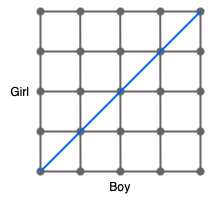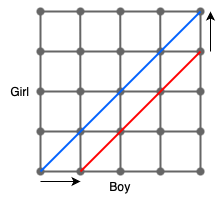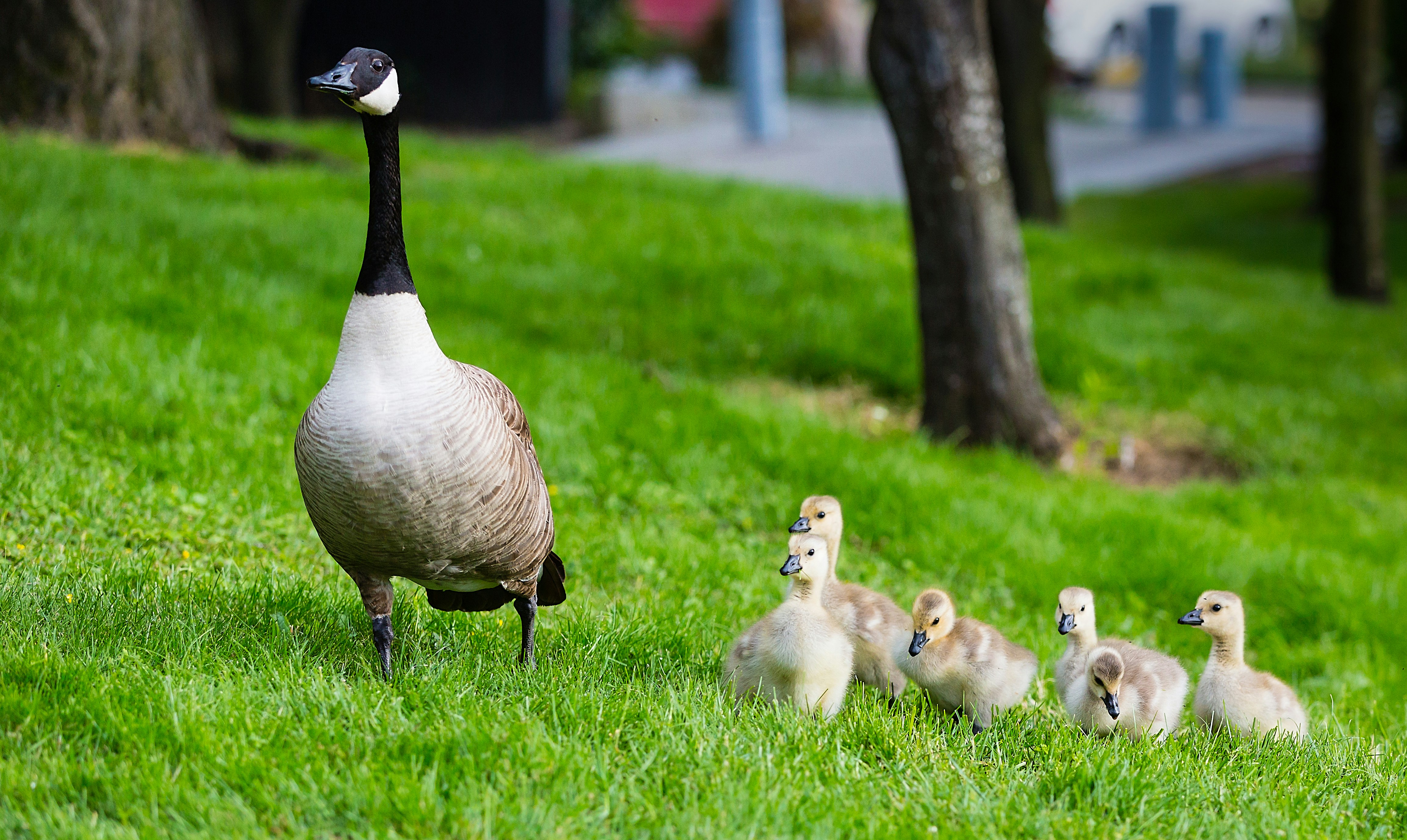The Question
A couple chooses to keep having children till they have an equal number of boys and girls. How many children will they have on average? [1]
In this article we will cover 2 ways to solve this problem. First using a random walk and proof by contradiction. The second is Optiver’s solution to this problem which use Dyck’s path.
Solution 1
Let $X_t$ denote the random variable for which child has been born at time $t$.
Given the first child is already born at time 0. If the first child is a boy, then let $X_t$ take the value 1 if a boy is born at time t and let $X_t$ be -1 if a girl is born at time t. Similarly, if the first child is a girl, then $X_t$ will take the value 1 if a girl is born at time t and we will take the value -1 if a girl has been born at time t.
Using the random variable $X_t$, we can model this question as a 1D random walk starting at the point 1.

Without loss of generality, we will assume the first child to be born is a boy. If the next child born is a boy, we go up one, otherwise we go down one.
$$X_t = \begin{cases} 1 \quad &w.p. 1/2 \ \ (\text{if a boy}) \\ -1 \quad &w.p. 1/2 \ \ (\text{if a girl})\end{cases}$$The random walk will finish once we hit 0 (i.e. when we have had equal number of boys and girls).
Now, let $W_x$ denote the number of walks starting from x to reach 0. More specifically, $W_x$ is the first time, given we have started at x, to hit 0.
$$\sum_{i=x}^{W_x} X_i = 0$$Our goal is to determine $\mathbb{E}[W_1]$, i.e. the number of children needed to have an equal number of boys and girls, given that our first child is a boy.
Spoiler warning. The answer is infinite and to prove this we will use a proof by contradiction. Given we are at step 1, let us suppose that $\mathbb{E}[W_1]$ is finite. Following this assumption and the formula for expectation:
$$\begin{align*}\mathbb{E}[W_1] &= \mathbb{P}[X_1 = -1] \mathbb{E}[W_1 | X_1 = -1] + \mathbb{P}[X_1 = 1] \mathbb{E}[W_1 | X_1 = 1] \\ &=\frac{1}{2}(1 + \mathbb{E}[W_0]) + \frac{1}{2}(1 + \mathbb{E}[W_2]) \\ &= 1 + \frac{1}{2}\mathbb{E}[W_2]\end{align*}$$Given you are at step 2, returning back to step 1 is equivalent to being at step 1 and returning to step 0, i.e., they are identically distributed.
$$\mathbb{E}[W_2] = \mathbb{E}[W_1] + \mathbb{E}[W_1]$$By substitution, we get:
$$\begin{align*}\mathbb{E}[W_1] &= 1 + \frac{1}{2}(\mathbb{E}[W_1] + \mathbb{E}[W_1]) \\ &= 1 + \mathbb{E}[W_1]\end{align*}$$This is a contradiction! As a result, the expected number of children to have before you hit 0 is infinite.
Solution 2
For this solution, we’ll start with the formula for the expectation of a discrete random variable.
$$\mathbb{E}[X] = \sum x . \mathbb{P}[X = x]$$In our case, let $X$ be the random variable denoting the number of children needed to reach parity. We can then rewrite the formula above as:
$$\mathbb{E}[X] = \sum_{x=2}^\infty x . \mathbb{P}[X = x]$$
To solve this formula, we need to find $\mathbb{P}[X = x]$ for each value of $x$. To do this, we will model this question as a 2D random walk. Lets take $x=10$ as an example and we’ll use the grid below.
 Anytime the couple gives birth to a boy, a step to the right is taken and if a girl is birthed, a step up is taken. Equality is reached when the path hits the blue line.
Anytime the couple gives birth to a boy, a step to the right is taken and if a girl is birthed, a step up is taken. Equality is reached when the path hits the blue line.
Representing the question using a 2d grid now opens the possibility of using something called Dyck’s path [2]. A Dyck path is a staircase walk from (0,0) to (n,n) that lies strictly below (but may touch) the diagonal y=x. The number of Dyck’s paths of order n is given by the Catalan number:
$$C_n = \frac{1}{n+1} \binom{2n}{n}.$$
If the first child is a boy and we are looking at the paths to hit equality by child 10, then we know the final step must be a girl.
 Using this methodology, any path from the first boy to the last girl which touches but does not surpass the red line, is a valid path. This allows us to use Dyck’s path of degree 4.
Using this methodology, any path from the first boy to the last girl which touches but does not surpass the red line, is a valid path. This allows us to use Dyck’s path of degree 4.
Consequently, the number of paths that start with a boy and achieves equality on the 10th child is 14. By symmetry, the number of paths that start with a girl and achieves equality on the 10th child is also 14.
To convert this to a probability, we will divide by the total number of possible paths by the 10th child, which is $2^{10} = 1024$. So the probability of achieving equality of the 10th child is:
$$\mathbb{P}[X=10] = \frac{14 + 14}{1024} = \frac{28}{1024}.$$Now, lets do the rest. Let $x=2k$ where $k\in \mathbb{Z}^+$.
$$\begin{align*} \mathbb{P}[X = 2k] &= \frac{2 C_{k-1}}{2^{2k}} \\ &= \frac{2}{k}\binom{2k-2}{k-1}\frac{1}{2^{2k}} \\ &= \frac{2}{4^kk} \binom{2k-2}{k-1}\end{align*}$$By substitution:
$$\begin{align*}\mathbb{E}[X] &= \sum_{k=1}^\infty 2k . \mathbb{P}[X = 2k] \\ &= \sum_{k=1}^{\infty} 2k \frac{2}{4^kk} \binom{2k-2}{k-1} \\ &= \sum_{k=1}^{\infty} \frac{1}{4^{k-1}} \binom{2k-2}{k-1} \end{align*}$$Substituting $n = k-1$ gives:
$$\begin{align*}\mathbb{E}[X] &= \sum_{n=0}^{\infty} \frac{1}{4^n} \binom{2n}{n} \end{align*}$$Using the fact that:
$$4^n = 2^{2n} = (1 + 1)^{2n} = \sum_{m=0}^{2n} \binom{2n}{m} < (2n + 1) \binom{2n}{n}$$$$\frac{1}{4^n} \binom{2n}{n} > \frac{1}{2n+1}$$$$\begin{align*}\mathbb{E}[X] &= \sum_{n=0}^{\infty}\frac{1}{4^n} \binom{2n}{n} \\ &> \sum_{n=0}^\infty\frac{1}{2n+1} \\ &> \sum_{n=0}^\infty \sum{1}{2n} \\ &= \frac{1}{2} \sum_{n=0}^\infty \frac{1}{n} \\ &\rightarrow \infty \end{align*}$$As a result, the expectation is infinite!
References
- Optiver (2024). Prove it - Ep5: Perpetual Children. [online] YouTube. Available at: https://www.youtube.com/watch?v=YllN9Pz15cU [Accessed 22 Dec. 2024].
- Weisstein, Eric W. “Dyck Path.” Mathworld.wolfram.com, 18 Dec. 2024, mathworld.wolfram.com/DyckPath.html.
